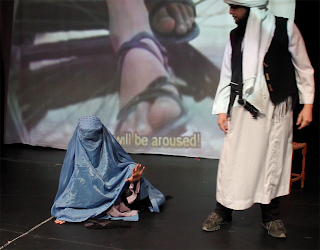Part of the DYSPLA Festival
Devised through the WHITEBOX Development Process
Directed by Pete Cain, Chryssanthi Kouri & Gary Thomas
★★★
Pros: Thought-provoking, with good use of projections and media.
Cons: The timings are not very clearly billed.
Our Verdict: A play and festival which champions a worthwhile and thought-provoking message about the creativity of dyslexic practitioners.
Y&P (formerly known as The Taliban Don’t like my Knickers) is a devised piece of theatre developed by dyslexic writers. Inspired by the novel In The Hands of the Taliban, it draws from the accounts of Yvonne Ridley, a journalist kept hostage by the Taliban in 2001. The piece was developed through a process called WHITEBOX which is a scheme run by DYSPLA . DYSPLA is a not- for- profit organisation on a mission to revolutionise how people see and understand dyslexia. This is the first year in which DYSPLA has received Arts Council funding support to run their festival, which has been running since 2007. The festival, at the Camden People’s Theatre, showcases Y&P but also an installation called the Whispering Theatre – which visitors can drop into before the show – as well as videos and information about the organisation’s wider activities and motivations.
Y&P is well acted and put together. It’s simply but effectively staged with all the action running infront of a rolling montage of media snippets and images relevant to the subject matter. The piece is quite stylized with the actors speaking stage directions rather than acting them out at certain points – which works well given the subject matter. The actual ideas explored in the play are a little predictable as the story of Yvonne Ridley is fairly old now. However, it’s still a thought-provoking and enjoyable watch with good use of audience participation. The play also serves the purpose of showcasing the success of the WHITEBOX process, which has produced a worthwhile piece of work and shows its potential for future development schemes like this.
The other elements to the festival were also interesting. The Whispering Theatre presented some great monologues, which were very well performed. They also prompted the audience to consider some quite thought provoking issues around the way dyslexic people are treated and made to feel during their formative years and beyond into wider society. It’s also clear that the format of the festival and other elements, like the accompanying printed programme, had been very carefully thought through to compliment the overall message of the festival. The experience as a whole prompts the audience to really think about approaching the installation and performances in a different way to the norm.
The one drawback for me personally was the way the festival was billed, as it wasn’t entirely clear on the website that the actual Y&P play would not start until later. However I can see that the festival organisers were keen for the audiences to engage with the as other elements on offer so billed the evening as starting at 7pm – but I do think a clearer itinerary would have been helpful.
Overall though, Y&P was an enjoyable piece which definitely served to demonstrate that encouraging and supporting dyslexic writers to produce work collaboratively is a worthwhile endeavour which should be further developed and supported.
Please feel free to leave your thoughts and opinions in the comments section below!

 Everything Theatre Reviews, interviews and news for theatre lovers, London and beyond
Everything Theatre Reviews, interviews and news for theatre lovers, London and beyond


